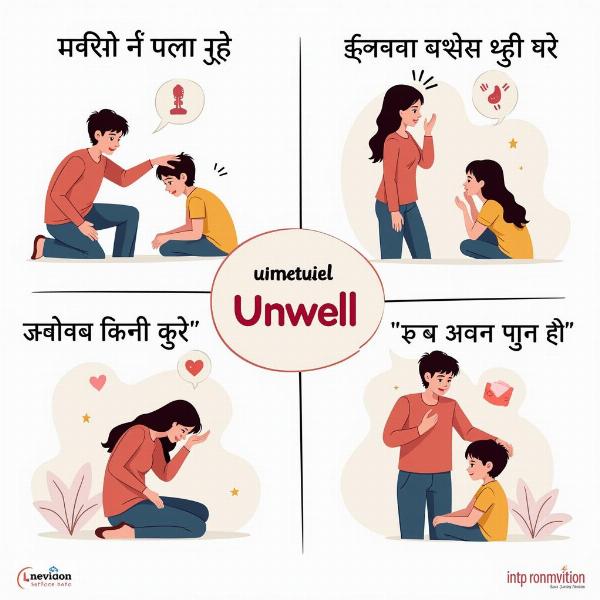Understanding the nuances of expressing ill health in Hindi can be crucial for clear communication. While a direct translation of “health is not good” might suffice, exploring various expressions can help convey the specific nature and severity of the ailment. This article delves into common Hindi phrases used to describe feeling unwell, offering insights into their cultural context and appropriate usage. Learning these phrases will not only enhance your language skills but also enable you to connect with Hindi speakers on a deeper level, especially when discussing health matters.
Common Ways to Say “Health Is Not Good” in Hindi
Several phrases in Hindi convey the meaning of “health is not good,” each with its own subtle connotations. Here are some of the most common ones:
-
तबीयत ठीक नहीं है (Tabiyat theek nahin hai): This is the most common and general way to express feeling unwell. It translates to “My health is not okay” and can be used for a wide range of ailments, from mild discomfort to more serious illnesses.
-
स्वास्थ्य अच्छा नहीं है (Swasthya achcha nahin hai): This phrase translates to “My health is not good” and is a more formal way of expressing ill health. It is often used in written communication or formal settings.
-
मुझे अच्छा नहीं लग रहा है (Mujhe achcha nahin lag raha hai): This translates to “I am not feeling well” and focuses on the feeling of discomfort rather than the state of health itself. It’s suitable for expressing general malaise.
-
मैं बीमार हूँ (Main bimar hun): This is a straightforward way of saying “I am sick” and implies a more noticeable illness.
-
मेरी तबियत खराब है (Meri tabiyat kharab hai): This phrase translates to “My health is bad” and suggests a more severe illness than “tabiyat theek nahin hai.”
 Common Hindi Phrases for Ill Health
Common Hindi Phrases for Ill Health
Expressing Specific Symptoms in Hindi
Beyond general expressions of ill health, being able to describe specific symptoms is essential. Here are some examples:
- सर दर्द (Sar dard): Headache
- बुखार (Bukhar): Fever
- खांसी (Khansi): Cough
- ज़ुकाम (Zukam): Cold
- पेट दर्द (Pet dard): Stomach ache
Why Knowing These Phrases is Important
Understanding these phrases is crucial for several reasons:
- Effective Communication: Accurately conveying your health status is essential, especially when seeking medical attention.
- Cultural Sensitivity: Using appropriate language demonstrates respect for Hindi speakers and fosters better understanding.
- Building Relationships: Showing empathy and concern for others’ health strengthens interpersonal connections.
Choosing the Right Phrase
The best phrase to use depends on the context and the severity of the illness. For minor ailments, “tabiyat theek nahin hai” is usually sufficient. For more serious illnesses, phrases like “main bimar hun” or “meri tabiyat kharab hai” might be more appropriate.
What to Do When You Hear Someone Say “Health Is Not Good” in Hindi
If someone tells you their health is not good, it’s important to respond with empathy and concern. You can say:
- क्या हुआ? (Kya hua?): What happened?
- आप कैसा महसूस कर रहे हैं? (Aap kaisa mehsoos kar rahe hain?): How are you feeling?
- मुझे उम्मीद है कि आप जल्दी ठीक हो जाएँगे (Mujhe umeed hai ki aap jaldi theek ho jayenge): I hope you get well soon.
Conclusion
Knowing how to express “health is not good” and related phrases in Hindi is essential for effective communication and cultural sensitivity. By learning these phrases, you can better navigate health-related conversations and build stronger relationships with Hindi speakers. Understanding the nuances of these expressions allows for more precise communication and demonstrates a deeper appreciation for the language and culture.
FAQ
- What is the most common way to say “I’m not feeling well” in Hindi? Tabiyat theek nahin hai is the most common phrase.
- How do I say “I have a headache” in Hindi? You can say Sar dard.
- Is “Swasthya achcha nahin hai” formal or informal? It’s considered more formal.
- How can I express concern for someone’s health in Hindi? Ask Kya hua? (What happened?) or Aap kaisa mehsoos kar rahe hain? (How are you feeling?).
- What does Meri tabiyat kharab hai imply? It implies a more serious illness than tabiyat theek nahin hai.
- How do I say “I hope you get well soon” in Hindi? You can say Mujhe umeed hai ki aap jaldi theek ho jayenge.
- What are some other common symptoms I can express in Hindi? Bukhar (fever), Khansi (cough), Zukam (cold), and Pet dard (stomach ache) are some examples.
Meaning-Hindi.in is your trusted partner for all your Hindi translation needs. We offer a wide range of professional translation services, including business and commercial document translation, certified and legal document translation, technical and user manual translation, website and localization services, educational and academic translation, and specialized translation in various fields. Need a quick and accurate translation? We offer expedited translation services as well. Contact us today at [email protected] or call us at +91 11-4502-7584. Meaning-Hindi.in is committed to delivering high-quality, culturally sensitive translations that bridge the language gap and facilitate effective communication.